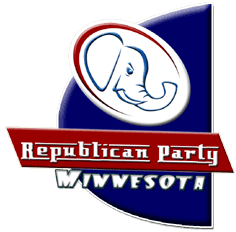Support for Minnesota GOP US House Candidates Rises 22 Percent in 2010
Support increases across all eight districts for Republicans; cumulative vote for DFLers falls below 48 percent for just the 3rd time in six decades

Republicans entered 2010 coming off their worst showing in congressional elections in 74 years – notching only 38.1 percent of the cumulative statewide vote for its eight candidates in 2008.
That was the worst performance turned in by either of the state’s primary political parties since the DFL merger in 1944, and the lowest for the GOP since the Democratic landslide of 1934 when Republicans only won 32.5 percent.
However, buoyed in part by their first competitive showing in the state’s 8th Congressional District for the first time since the mid-1940s, support for GOP congressional candidates statewide soared 22 percent this cycle – from 38.1 percent in 2008 to 46.4 percent in 2010.
While that number was still short of the 47.9 percent won by the eight DFL congressional candidates across the Gopher State, it was the 5th best showing by Republicans since 1972.
Support for the GOP increased across all eight congressional districts from 2008 to 2010, rising 34.0 percent in the 1st CD, 10.5 percent in the 2nd CD, 21.2 percent in the 3rd CD, 10.5 percent in the 4th CD, 9.5 percent in the 5th CD, 13.1 percent in the 6th CD, 35.7 percent in the 7th CD, and 49.7 percent in the 8th CD.
Increase in GOP Vote in Minnesota’s U.S. House Elections by District, 2008 to 2010
| District |
2008
|
2010
|
% Change
|
| 1 |
32.9
|
44.1
|
+34.0
|
| 2 |
57.3
|
63.3
|
+10.5
|
| 3 |
48.5
|
58.8
|
+21.2
|
| 4 |
31.3
|
34.6
|
+10.5
|
| 5 |
22.0
|
24.1
|
+9.5
|
| 6 |
46.4
|
52.5
|
+13.1
|
| 7 |
27.7
|
37.6
|
+35.7
|
| 8 |
32.2
|
48.2
|
+49.7
|
Table compiled by Smart Politics.
The high water marks for the Republican Party over the past 40 years came in 1980 (51.8 percent), 1994 (48.4 percent), 2002 (46.8 percent), and 1978 (46.6 percent).
1980 was the last time more Gopher State voters cast their ballots for Republican congressional candidates than DFLers.
Republicans have historically struggled to win a majority of the vote in U.S. House elections statewide, doing so only in four elections since 1954 (in 1962, 1966, 1968, and 1980), compared to 23 times for the DFL across these 29 election cycles.
Statewide support for the DFL in 2010, meanwhile, dropped below the 50 percent mark for just the sixth time since 1954 – sinking to its third worst showing during this 56-year span.
Only during the elections of 1980 (47.6 percent) and 1968 (47.7 percent) did Minnesotans show less support for the DFL’s congressional candidates than they did in 2010 (47.9 percent).
Since the DFL merger in 1944, the 2010 election marks the seventh lowest percentage of the vote received for its Party’s candidates.
Cumulative votes for third party and independent candidates, meanwhile, reached their third highest level since the 1944 DFL merger. Over 117,000 votes were cast for such candidates on November 2nd, or 5.6 percent of the vote, behind only 1992 (7.3 percent) and 2000 (5.8 percent) over the last 66 years.
Minnesota U.S. House Votes Received By Party, 1944-2010
| Year |
DFL
|
GOP
|
Other
|
| 2010 |
47.9
|
46.4
|
5.6
|
| 2008 |
57.5
|
38.1
|
4.3
|
| 2006 |
52.9
|
42.4
|
4.7
|
| 2004 |
51.4
|
45.4
|
3.2
|
| 2002 |
49.9
|
46.8
|
3.4
|
| 2000 |
52.2
|
42.0
|
5.8
|
| 1998 |
53.5
|
42.3
|
4.2
|
| 1996 |
55.1
|
41.8
|
3.1
|
| 1994 |
50.6
|
48.4
|
1.0
|
| 1992 |
51.8
|
40.9
|
7.3
|
| 1990 |
58.5
|
41.4
|
0.1
|
| 1988 |
58.3
|
41.1
|
0.5
|
| 1986 |
59.7
|
40.0
|
0.3
|
| 1984 |
53.7
|
45.7
|
0.6
|
| 1982 |
54.6
|
44.4
|
0.9
|
| 1980 |
47.6
|
51.8
|
0.6
|
| 1978 |
51.2
|
46.6
|
2.3
|
| 1976 |
58.0
|
40.6
|
1.4
|
| 1974 |
57.9
|
40.4
|
1.8
|
| 1972 |
53.1
|
45.0
|
1.9
|
| 1970 |
53.1
|
46.7
|
0.2
|
| 1968 |
47.7
|
52.2
|
0.1
|
| 1966 |
48.4
|
51.6
|
0.0
|
| 1964 |
54.4
|
45.6
|
0.1
|
| 1962 |
49.7
|
50.2
|
0.0
|
| 1960 |
50.2
|
49.5
|
0.4
|
| 1958 |
53.3
|
46.7
|
0.0
|
| 1956 |
51.3
|
48.7
|
0.0
|
| 1954 |
53.0
|
47.0
|
0.0
|
| 1952 |
46.0
|
54.0
|
0.0
|
| 1950 |
46.5
|
52.9
|
0.5
|
| 1948 |
49.8
|
50.2
|
0.0
|
| 1946 |
40.9
|
58.8
|
0.3
|
| 1944 |
40.8
|
58.9
|
0.3
|
Table compiled by Smart Politics.
Follow Smart Politics on Twitter.
